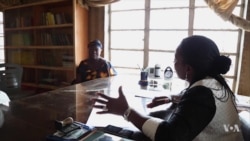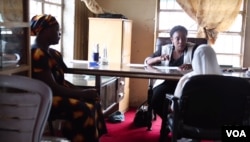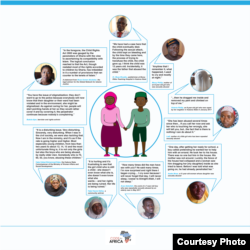Mercy Philip will never forget January 12, 2017.
That’s the day she says her 8-year-old daughter walked up to her and asked if she could wash her panties.
Philip asked her daughter why she needed to wash her panties and her daughter said a male neighbor had "climbed on her body" and then told her to wash her panties afterward.
The mother immediately took her daughter to a clinic. And on the same day, Philip and her husband went to the police. The neighbor, who was arrested based on the medical report, was released from jail and is awaiting trial.
Yet the family's life has been upended.
They have been ridiculed by people in the community, pressured to drop the charges, and condemned for “trying to ruin a man’s life,” Philip said. When her daughter goes outside, people stare, laugh or throw stones at her, the mother said.
Social stigma
The shame and social stigma attached to sexual abuse stops most families in Nigeria from seeking justice. They usually end up settling cases of child sexual abuse through cash payments often quietly negotiated by religious leaders.
“To settle means to forget about it ... let sleeping dogs lie,” said Bukola Ajao, the Philips' lawyer. “Please, we are sorry, but this kind of matter is not something that you just apologize for.”
The most recent data available on child sex abuse in Nigeria is from 2014. That study — from Nigeria's National Population Commission, the U.N. Children’s Fund and the U.S. Centers for Disease Control and Prevention — revealed that 1-in-4 girls and 1-in-10 boys in Nigeria experience sexual violence before the age of 18.
The Barau Dikko Teaching Hospital at Kaduna State University in the Kaduna state capital handles requests to provide evidence for suspected child sex abuse. At the time VOA visited the hospital, in the space of 30 minutes, more than five women with children had entered the ward.
All are new cases of suspected child abuse, according to Dr. Musa Shuaibu, a pediatrician.
“Nearly on a daily basis, there would be one form of abuse or the other. And that is quite alarming in view of the fact that quite a negligible fraction, actually get reported to the hospital,” Shuaibu said.
Activists seek new law
Activists are lobbying Kaduna state to approve the federal Child Rights Act of 2003 that mandates a 14-year jail sentence for a child sex abuse conviction and life imprisonment for rape. Eleven states in the north, including Kaduna, have not ratified it. Instead, those states rely on Sharia courts and a colonial-era penal code to prosecute child sex abuse.
Kaduna State Minister of Women and Social Development Hajia Hafsatu Mohammed Baba told VOA the state government is committed to passing it. But the Supreme Sharia Council has said that the federal statute is a Western import and an attempt to restrict Sharia courts.
Meanwhile, families are often left with only difficult choices.
“You know how things are around here. Things like this can never be buried,” said Asabe Musa, whose daughter was molested when she was 5 years old. "This is the kind of story that goes around … maybe when the girl does find someone to marry, someone will go and tell his family what happened to her."
After hearing about the abuse, relatives of Musa’s husband, who live in northern Nigeria, traveled to Kaduna to speak with Musa about settling the case. Afterwards, they took the child with them, hoping that she would be less stigmatized in a community where she is unknown.
Musa, whose face is lined with sorrow, said she wants her daughter back.
Few go to court
At one orphanage in the center of town, children dance around together in a circle. A slender young woman clenches the hand of her little girl. The woman, who asked to be identified as Ladi, said she can’t go to court as it was her father who raped her young daughter.
“My daughter was covered in blood. I picked her up and just stood there. He was someone I had always respected, so I didn’t say anything to him. I picked her up and went to town with her in the morning,” she said.
She has been running ever since. Going back to her village is not an option, she said, as her father is a chief there.
For the past decade, Hauwa Hassan, the owner and manager of the orphanage, has worked with about 20 families dealing with child sex abuse. She says only three of them took her advice to go to court. Those cases were never concluded.
One 7-year-old orphan said he was walking to school when an old fruit seller offered a pear to lure the boy into the back of his shop. The abuse went on until the boy complained to his uncle about pains in his body.
“When it happened, the first thing we did was we stopped him from going out and even from school and kept him at home,” the boy's uncle, Anas Umar, said, blinking hard to stop the tears.
"I wrote the police statement myself. A lot of my friends first suggested we all go and beat him up, but I didn't because of what could follow. I can't take the law into my own hands… I can't just go and take his sins upon myself," he added. "Other people were telling me to just leave the matter because the man is too old, but what he did was serious…The judgment passed was not enough, but still, I thank God there was some sort of judgment."
The court found the fruit seller guilty under a colonial-era sodomy law. He couldn’t pay the 80,000 naira — about $200 — fine so he is serving a 3-year jail sentence.
“That is what he deserved. That will scare others like him," Umar said. "The judgment passed was not enough but still, I thank God there was some sort of judgment.”
This reporting was supported by Code for Africa, a data journalism initiative.









